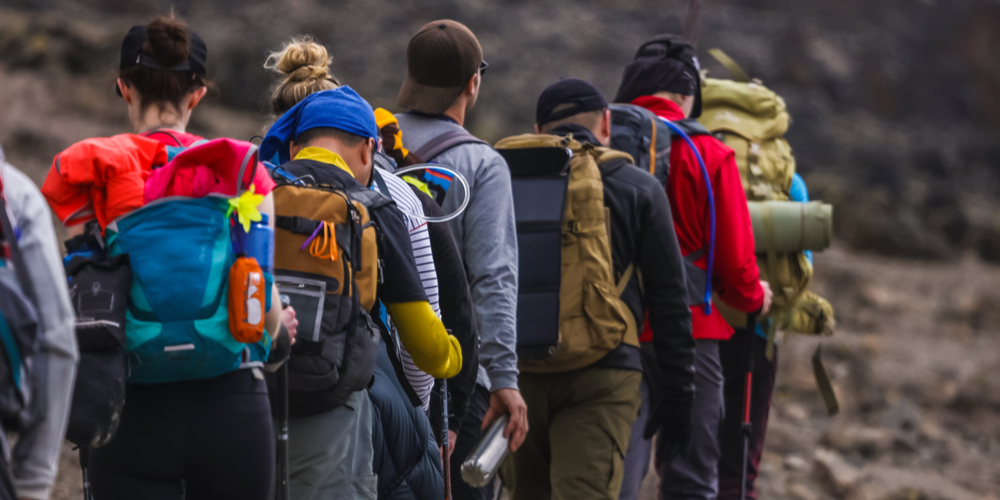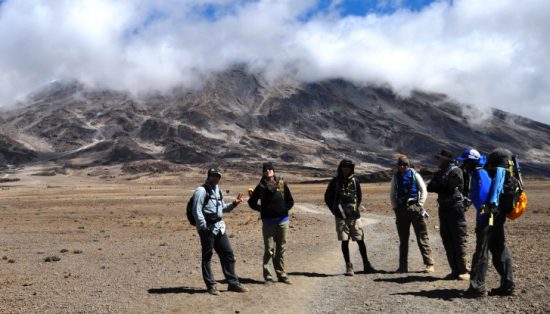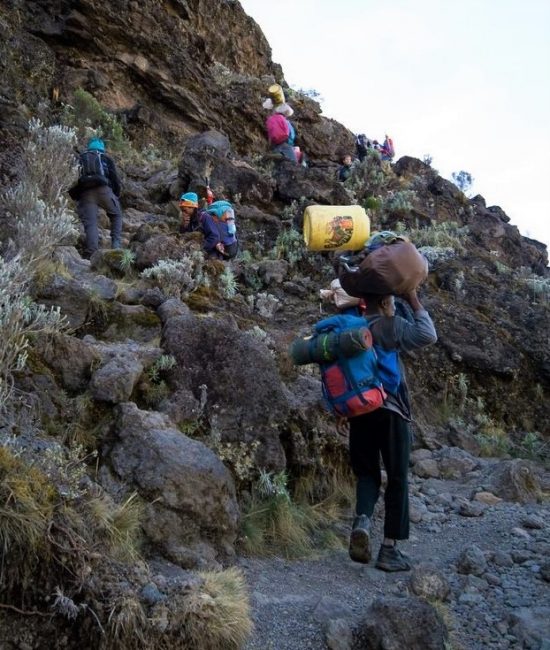Kilimanjaro Guides & Porters
You may be surprised about how many people climb with you.
I was.

Your support staff for climbing Kilimanjaro is made up of many individuals. Depending on the size of your group, there may be one or more assistant guides. who are responsible for helping the lead guide manage the climbers. There is a cook who prepares the food for everyone. And then there are porters who prepare the campsites and carry the heavy bags on the trail. It’s not uncommon to have four porters for each paying client. So a group of 10 climbers can have 40 porters!
The most important person on your trip is your guide.
The lead guide can make or break your trip. He or she is responsible for making all decisions with respect to the climb, including what pace to walk, when to rest, and when to send a climber down the mountain. Guides are most often local Tanzanians (some international companies will fly in a western trip leader to lead the group in conjunction with local assistant guides) who grew up near the mountain.

All guides are required to be licensed with Kilimanjaro National Park. Licensing is obtained only after guides have gone through training, which includes classes in first aid and mountain rescue. They are required to learn about the history of the mountain, the geography, the effects of altitude, and how to handle all emergencies. Guides are fluent in English and are very personable.
Most Kilimanjaro guides are professionals who have climbed and summited countless times. They are very experienced, having dealt with a breadth of issues while on tours.
The local guides start by working as common porters, climbing the mountain dozens of times per year. Through hard work, physical skills, leadership qualities and mountain intelligence, these porters are promoted through the ranks to eventually become a guide. This takes several years, at best, for the individuals showing the most promise.
On the mountain, your guide is your mentor and it is his duty to advise, lead, support and encourage you to safely achieve your personal goals, then to bring you down to the gate again. It is important that you work closely with your guide and follow his advice.

The mountain chef might be the most beloved person in your party. Nearly all meals on the mountain are prepared fresh- except for the occasional picnic lunch. Preparing and cooking food at altitude (often in bad weather conditions) takes skill and patience, these guys are superstars! The chef is responsible for knowing any dietary restrictions of each climber and adjusts the meals accordingly.
Your porters are the workhorses. They perform the most physically demanding job on the mountain. They carry the camping and cooking supplies for the entire group, such as tents, sleeping bags, food and water, cookware, gas, stoves, medical supplies, chairs, and tables. Not only do they carry the shared equipment, but they also carry the personal items of the clients.
Porter loads is limited to 20 kgs by the park service. Their bags are weighed at the entry gate. More porters may need to be allocated to the climb crew if loads exceed National Park regulations.
Altogether, this team of individuals will make your climb as comfortable as possible. Though they make a decent living by Tanzanian standards, they are on the mountain many days out of the year and have a physically demanding job. They depend on tips, and climbers should budget a substantial tip for their climbing crew.
How do you know if the guides and porters are treated well?
Climbers coming to Kilimanjaro should do some research about what they are asking people to do. Unless you want to be part of the exploiting class, don’t agree to just get a cheap trip. Unless you are prepared to watch that young lad, in tears, trying to drag your 40 kilos of baggage up the mountain. You are putting him in danger, as well as making him suffer.
Seamus Brice-Bennett, Marangu Hotel
There is a stellar organization that monitors Kilimanjaro operators’ treatment of their staff. Known as the Kilimanjaro Porters Assistance Project (KPAP), this group aims to improve the working conditions of porters on Mount Kilimanjaro. It was founded in 2004.
A set of guidelines drawn up by KPAP include:
- Porters are paid a minimum of 20,000Tsh per day, the wage amount accepted by the porter unions in 2014.
- Salaries must be paid within 2 days of the descent of a climb
- A transparent tipping procedure so porters receive the full tip amount intended for them
- Loads carried by the porter should not exceed 20 kg for the company excluding porters personal kit
- Porters are provided with 3 meals per day
- Porters have proper shelter conditions and sleeping equipment
- Porters are outfitted with proper gear
- Sick or injured porters are properly cared for
These practices should be the standard for every operator on the mountain but unfortunately they are not!
Most Kilimanjaro companies do not treat their staff well. Do not support Kilimanjaro companies that do not have the ethics to abide by these simple guidelines. There is NO REASON whatsoever, other than pure greed, that companies are not be able to provide for their guides and porters. Companies that can be trusted to treat their crews fairly are KPAP partners.
The question is whose responsibility is it to ensure there is fair treatment? We would like to say it is the climber’s responsibility to make sure they are climbing with an organization that is adhering to proper treatment of their crew.
Karen Valenti, Kilimanjaro Porters Assistance Project
Be sure that your chosen outfitter is a KPAP partner.
They are listed here.